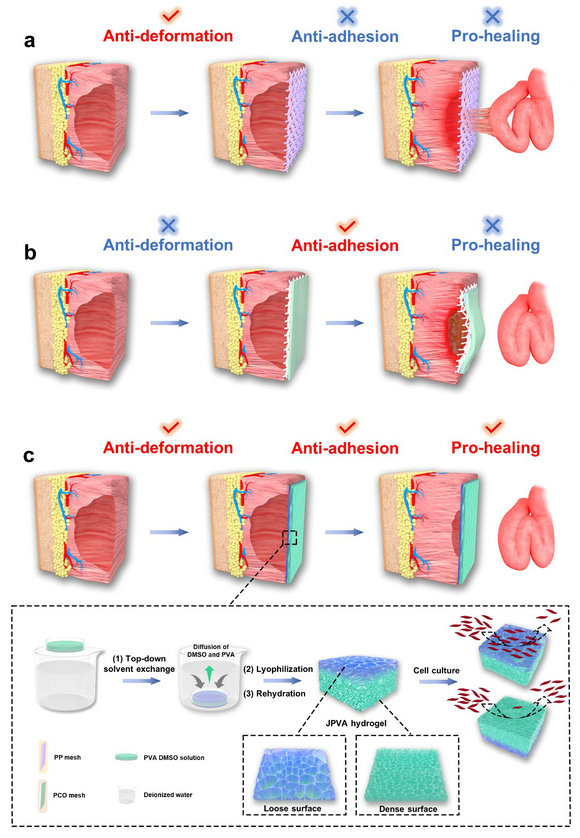Source: The Sixth Affiliated Hospital
Edited by: Zheng Longfei, Wang Dongmei
Internal soft tissue defect is often caused by surgical trauma, oncologic resection of primary or secondary tumors, traumatic injury, soft tissue infection and so on in abdominal wall, chest wall and dura, leading to at least 400,000 surgeries and more than 10 billion dollars of medical expenses every year all over the world. Repair of internal soft tissue defect has attracted remarkable attention in recent years for surgical challenge and undesirable treatment outcomes. Implantable meshes used in tension-free repair operation facilitate treatment of internal soft tissue defect. However, clinical meshes fail to achieve anti-deformation, anti-adhesion and pro-healing properties simultaneously, leading to undesirable surgery outcomes.
Recently, the research group directed by Prof. Dingcai Wu from School of Chemistry, Sun Yat-sen University and Prof. Hui Wang from the Sixth Affiliated Hospital, Sun Yat-sen University successfully developed a novel peritoneum-inspired Janus porous PVA hydrogel (JPVA hydrogel) to achieve efficient repair of abdominal wall.
The work entitled “Peritoneum-inspired Janus porous hydrogel with anti-deformation, anti-adhesion and pro-healing characteristics for abdominal wall defect treatment” was recently published in
Advanced Materials (Impact factor 30.849). Prof. Hui Wang and Dr. Rongkang Huang from the Sixth Affiliated Hospital and Prof. Dingcai Wu and Dr. Bingna Zheng from School of Chemistry were the corresponding authors. Weiwen Liang from the Sixth Affiliated Hospital and Wenyi He from School of Chemistry were the co-first authors of the paper.
Inspired by peritoneum, of which the side facing viscera has dense structure with anti-adhesion property, while the other side facing abdominal wall muscle has loose porous structure beneficial for cell adhesion, a novel biocompatible Janus porous PVA hydrogel (JPVA hydrogel) was developed to achieve anti-deformation, anti-adhesion and pro-healing properties simultaneously by the facile yet efficient strategy based on top-down solvent exchange. The densely porous and smooth bottom-surface of JPVA hydrogel minimized adhesion of fibroblasts and did not trigger any visceral adhesion, and its loose extracellular matrix-like porous and rough top-surface could significantly improve fibroblast adhesion and tissue growth, leading to superior abdominal wall defect treatment to commercially available PP and PCO meshes. With unique anti-swelling property (swelling ratio: 6.4%), this JPVA hydrogel had long-lasting anti-deformation performance and maintained high mechanical strength in internal wet environment. By integrating visceral anti-adhesion and defect pro-healing with anti-deformation, JPVA hydrogel patch is expected to become an ideal material for clinical tension-free soft tissue repair.

Figure 1. Schematic illustration of structure and abdominal wall defect repair properties for a) conventional PP mesh, b) classical PCO mesh, and c) our JPVA hydrogel patch, which is prepared through top-down solvent exchange, lyophilization and rehydration. a) Conventional PP mesh has excellent anti-deformation property, but usually causes severe visceral adhesion and undesirable defect healing. b) Classical PCO mesh can prevent visceral adhesion, but suffers from deformation and undesirable defect healing. c) Due to its Janus porous structure and high hydrogen bond crosslinking density, our JPVA hydrogel has unique asymmetry cell adhesion behaviors, excellent mechanical and anti-swelling properties, and thus demonstrates properties of anti-adhesion, pro-healing and anti-deformation simultaneously, leading to superior repair effect of abdominal wall defect.
Link to the paper:
https://onlinelibrary.wiley.com/doi/epdf/10.1002/adma.202108992



